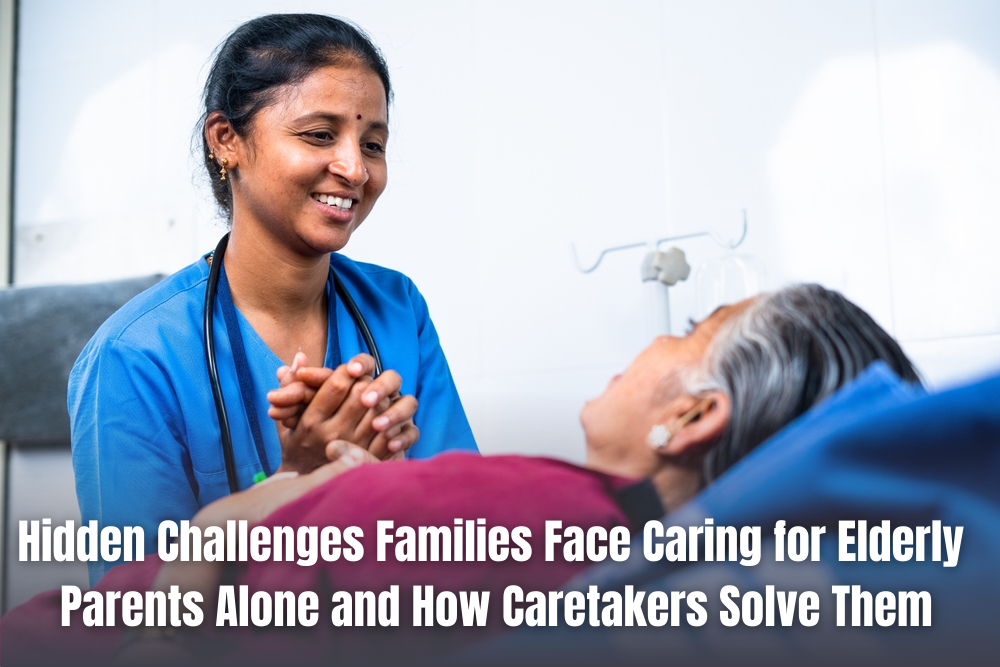Caring for elderly parents is one of the most loving responsibilities a family can take on—but when done alone, it often comes with hidden challenges that many don’t anticipate. From emotional exhaustion to constant medical responsibilities, families may quickly feel overwhelmed.
In this article, we’ll explore the most common difficulties families face while caring for their elderly parents on their own, and how professional caretakers can step in to provide the right support.
Hidden Challenges Families Face
1. Physical Exhaustion
Elderly care often means lifting, helping them walk, assisting with bathing, or managing long nights of restlessness. Families can quickly feel drained, especially without proper training.
2. Emotional Stress
Watching a parent’s health decline is emotionally heavy. Families often feel anxious, guilty, or helpless when they cannot manage everything on their own.
3. Missed Medical Needs
With busy schedules, it’s easy to forget medicines, delay doctor visits, or overlook subtle changes in health—mistakes that can have serious consequences.
4. Financial and Time Strain
Balancing jobs, household duties, and caregiving often leaves families with no personal time. This can also affect professional commitments and financial stability.
5. Safety Concerns
Seniors are at high risk of falls, choking, or sudden medical emergencies. Without trained support, families may panic in these situations.
How Caretakers Solve These Challenges
1. Daily Living Support
Caretakers help with bathing, feeding, mobility, and hygiene, reducing the physical load on family members.
2. Medication and Health Monitoring
They give medicines on time, check vitals like blood pressure or sugar, and keep families updated about health changes.
3. Emotional Companionship
Caretakers provide company and conversation, helping seniors fight loneliness and anxiety. This also eases the family’s emotional stress.
4. Emergency Readiness
Trained caretakers know how to act quickly during emergencies—whether it’s low oxygen levels, sudden pain, or a fall.
5. Peace of Mind for Families
With a caretaker, families can focus on bonding with their parents instead of being constantly burdened with caregiving responsibilities.
Why Caretakers Are Becoming Essential in India
With more families living in nuclear households and children working away from home, caretakers provide the support system elderly parents need daily. They act as an extension of the family, making sure seniors feel cared for and safe.
FAQs
Q1: What’s the difference between a caretaker and a nurse?
A caretaker helps with daily living activities and companionship, while a nurse provides medical care like injections, wound dressing, or managing oxygen support.
Q2: Can caretakers stay 24/7 with elderly parents?
Yes, you can hire caretakers for part-time, full-time, or round-the-clock support, depending on your parent’s condition.
Q3: Will a caretaker also cook food for my parent?
Caretakers usually help with feeding and preparing simple meals or assisting with diets as instructed by the family or doctor.
Q4: How do I know if my parent needs a caretaker?
If your parent struggles with basic activities, feels lonely, forgets medicines, or needs constant supervision, a caretaker is highly recommended.
Conclusion
Caring for elderly parents alone is an act of love, but it can leave families exhausted and overwhelmed. A trained caretaker brings balance by ensuring seniors get the help, safety, and companionship they need—while giving families peace of mind.
At Shree Swami Samarth Patients Seva (www.sssps.in), we provide trained, compassionate caretakers who treat your parents like their own. With our experience in elderly care, you can rest assured your loved ones are in safe hands.


